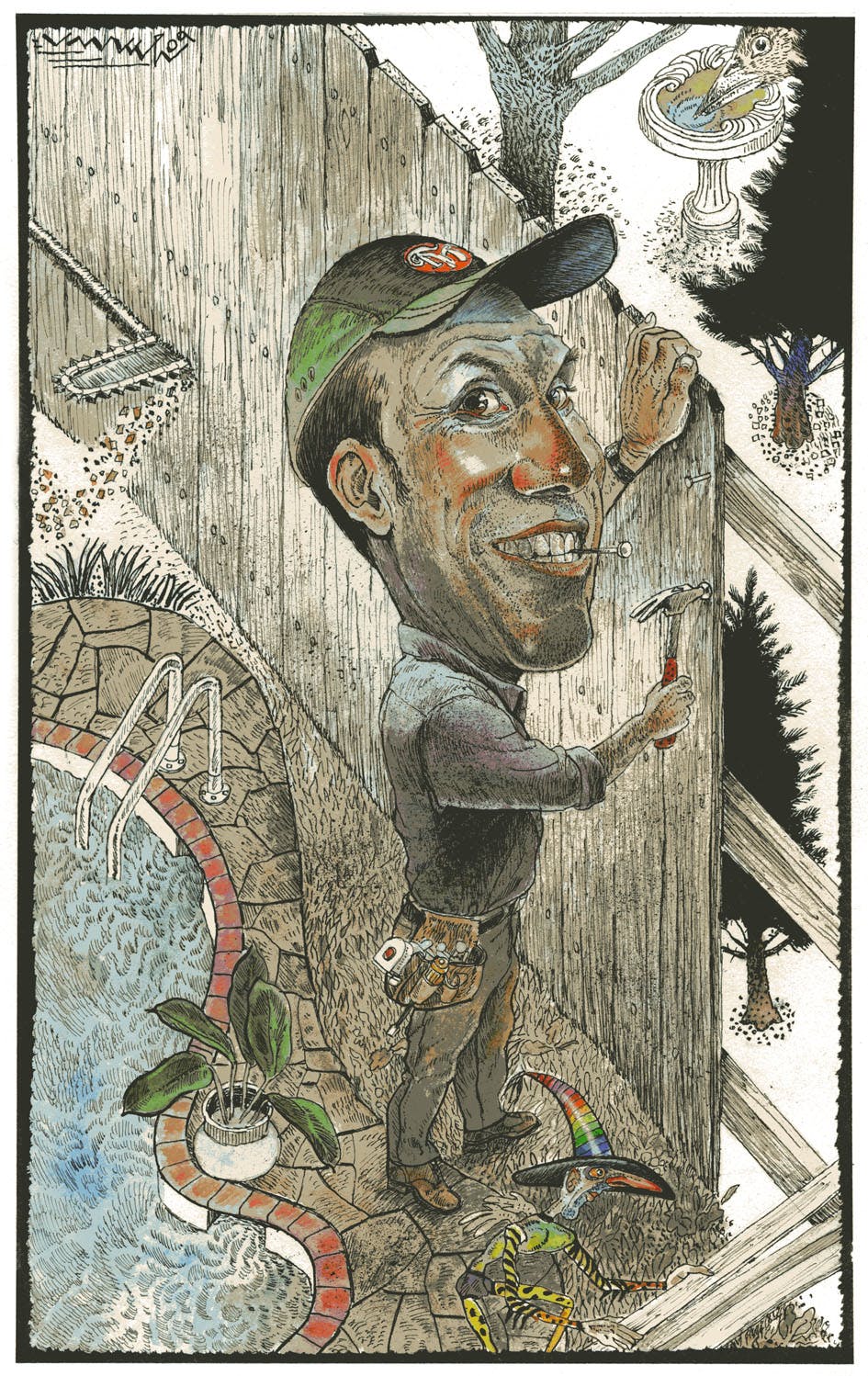
Q: Can anything be done about my infuriatingly ill-mannered neighbors?
Marty B., Dallas
A: Unkempt grounds? Revolting garbage cans? All-night parties? Illegal day care? Unlawful rodent storage and disposal? During his adventures in the housing markets, the Texanist has dwelt in a variety of zip codes, some more savory than others, and has known many a neighborly disturbance. On the whole, however, he has found that the simple concept of doing unto others as you would have them do unto you has been so repeatedly drilled unto, onto, and into young Texans that even the most annoying, engine-gunning-in-the-driveway yokel can be persuaded to recall his manners. We can all thank our mothers for that. The fact is, the citizenry of this fine state end up mostly civil and mostly tolerant of one another. Sure, sure, there are always rapscallions who slip through the sturdy weave of our social fabric and end up subletting the two-bedroom next door with all five members of their alt-country band and two spasmodic dogs. But even in these unfortunate instances, the Texanist has found that, Robert Frost’s famous dictum notwithstanding, it is a good neighbor that makes a good neighbor. Frost, of course, waxed eloquent on your question in his 1914 hit “Mending Wall,” of which the only line anyone can remember is “good fences make good neighbors.” There’s a reason this poetic fragment has stood the test of time. The Texanist is all for killing them with kindness, but in some cases, the answer may just be eight feet of dog-eared, cedar-picket privacy.
Q: I’m a native Texan. I moved to Alaska about fifteen years ago after coming to realize that there may actually be something worthwhile to see or experience north of the Red River. I will be able to retire from my job in five years, and our plan—my wife and I—is to return to East Texas. My wife is not a native Texan; she was born and raised in the Pacific Northwest. We’ve visited Texas annually, usually in the fall, for the past ten years, and she really seems to like all that is Texas. My problem is this: Last week she was with her son and grandkids in Washington State, and she called me complaining how hot it was there (75 degrees). How can I convince her that 100-plus-degree summers in Texas are actually better than 60- and 70-degree summers anywhere else?
Bill Eblen, Sitka, Alaska
A: Another great frontiersman, Davy Crockett, once faced a similar dilemma. His ploy was to simply send a letter to his family back in Tennessee in which he referred to Texas as “the garden spot of the world.” Sounds pretty appealing, doesn’t it? Just to make sure they didn’t miss his point, Crockett added that Texas had “the best land and best prospects for health I ever saw and I do so believe it is a fortune to any man to come here.” The letter had its desired effect, and the rest is Texas history. Now, Crockett wrote his letter from San Augustine on January 9. As a native East Texan, you know well that the average temperature at that place and time hovers at a garden-spot-of-the-world-like 60 degrees. Had it been written at most any other time of year, the gist of his missive might have been a smidge different, if it could have been read at all through the sweat smudges. Nonetheless, many generations of acclimation later, we here in “the blast furnace spot of the world” tend to agree with you, Mr. Eblen: Even at its swelteringest, there is still no better place than Texas. But the Texanist’s brain is not too heat addled to anticipate that you may still have some small measure of trouble transplanting your bride from Sitka-by-the-Sea, with its all-time-high temperature of 87 degrees. Start early. You’ve got five years. Repeat: “garden spot of the world,” “best prospects for health,” “garden spot of the world,” “best prospects for health.” She’ll love it.
Q: Why can’t she put the dadgum seat up?
Name Withheld
A: The Texanist knows what you are thinking: Were all toilet seats left in their logical resting positions (up), then nobody seeking an unsoiled locale for an evacuative perch would ever again be left to deal with an unclean one. Problem solved, right? Wrong. In addition to occasionally missing the bowl, you have also missed a significant point or two with regard to these kinds of business dealings. To begin with, a toilet that is used by a woman alone has almost nothing in common with a dedicated male can. The former is basically a pleasant seat with a shelf for holding a pleasantly scented, restorative potpourri, whereas the latter is really no more than an open sewer. But here’s the key: When the sexes share a john, it must hew to the girls-only standard. No sense in arguing. This is according to long-held and impossible-to-overturn conventions that dictate proper behavior between ladies and gentlemen. Get used to it. And while you’re at it, learn to enjoy holding open the dadgum door, pulling out the dadgum chair, and throwing down the dadgum raincoat over the dadgum puddle. You will expend little energy in doing so, and even the most radical of feminists will appreciate the courtesy.
Q: I have lived in Texas for six years, and a friend who was born here just now informed me that I’m not allowed to use beans as an ingredient in my chili. Is this true?
Debbie M., Dallas
A: Truth be told, the Texanist has always been more of a ladler than a pot stirrer, preferring to do his sweating over a big XXX bowl of red rather than the stove, but holy frijole, Debbie, do you realize what kind of fire you’re playing with here? We’re talking about beans. In chili. Your friend has done you a real solid by passing along this information, but he apparently has not conveyed to you the seriousness of the situation. Chili is the official state dish of Texas. There are chili purists in this otherwise-friendly state (official state motto: “Friendship”) who consider it a capital offense for even one bean to be put into a chili pot. Were this rough lot to get wind of your malfeasance, looks of derision and catcalls would rain down on you so hard that you would wish you’d never moved here. You’d be on the constant lookout for chuck wagons (official state vehicle) full of peculiarly dressed townsfolk (large-sized cutoffs, button-covered novelty suspenders, coonskin hats, and aprons that say things like “Hot Stuff” and “Too Hot to Handle”) roaming around looking incensed. Officials with the Chili Appreciation Society International would instantly disqualify you were you to enter your legume stew in one of their annual competitions. In short, you could probably expect a good pantsing before being loaded onto a one-way train out of here. Next stop, Sheboygan! You are advised to cease putting beans in your chili. And never ever let anyone know about this.








